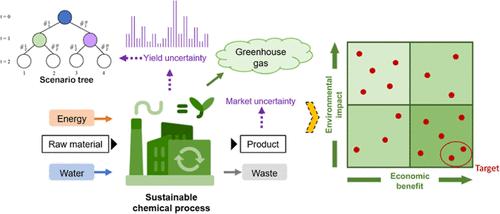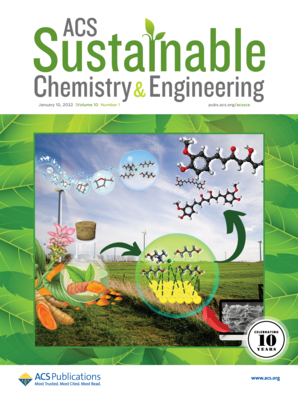Multi-Stage Stochastic Programming Under Endogenous Uncertainty of Integrated Sustainable Chemical Process Design and Expansion Planning
IF 7.1
1区 化学
Q1 CHEMISTRY, MULTIDISCIPLINARY
引用次数: 0
Abstract
Effective decision-making is essential for minimizing the environmental footprint while strengthening the competitiveness of the chemical industry. This paper proposes a multistage stochastic programming (MSSP) framework to take into account the design and expansion planning simultaneously for a sustainable multinetwork that integrates the water treatment, renewable energy supply, and carbon capture, utilization and storage (CCUS) with a main chemical processing sector under endogenous uncertainty related to conversion rates arising from the possible processing steps. Both economic and environmental concerns are involved in the optimization model for the entire system. The resulting mixed-integer linear programming (MILP) model is then solved using the Lagrangean decomposition algorithm. The proposed framework is further implemented in xylitol process design problems. Four cases are established based on different combinations of uncertain parameter distributions and time horizons, with model complexity increasing sequentially. The effectiveness of the proposed framework is further validated under new randomized sampling scenarios. The results indicate that integrating multinetworks can significantly reduce carbon emissions, thereby mitigating environmental impacts while satisfying production demands. Specifically, carbon dioxide (CO2) can be fully captured and optimally utilized, wastewater can be completely treated, and economic benefits can be effectively maximized. In comparison to the deterministic model, the MSSP counterpart offers a sustainable, robust, and reliable solution for integrated design and expansion planning over the specified time horizon. Additionally, it achieves the value of stochastic solution (VSS) of 2%, potentially saving millions of dollars in long-term capacity planning, thereby underscoring the advantages of incorporating endogenous uncertainty into the problem formulation.

内生不确定性下的多阶段随机程序设计--综合可持续化工工艺设计与扩产规划
有效的决策对于最大限度地减少环境足迹,同时增强化工行业的竞争力至关重要。本文提出了一个多阶段随机程序设计(MSSP)框架,在可能的加工步骤所产生的转换率相关的内生不确定性下,同时考虑可持续多网络的设计和扩展规划,该网络将水处理、可再生能源供应、碳捕获、利用和储存(CCUS)与主要的化学加工部门整合在一起。整个系统的优化模型涉及经济和环境问题。由此产生的混合整数线性规划(MILP)模型将使用拉格朗日分解算法进行求解。所提出的框架进一步应用于木糖醇工艺设计问题。根据不确定参数分布和时间跨度的不同组合,建立了四种情况,模型复杂度依次增加。在新的随机抽样方案下,进一步验证了所提框架的有效性。结果表明,整合多网工程可以显著减少碳排放,从而在满足生产需求的同时减轻对环境的影响。具体来说,二氧化碳(CO2)可以得到充分捕获和优化利用,废水可以得到完全处理,经济效益可以有效实现最大化。与确定性模型相比,MSSP 对应模型为指定时间范围内的综合设计和扩建规划提供了可持续、稳健可靠的解决方案。此外,它还实现了 2% 的随机解决方案价值 (VSS),可能为长期产能规划节省数百万美元,从而凸显了将内生不确定性纳入问题表述的优势。
本文章由计算机程序翻译,如有差异,请以英文原文为准。
求助全文
约1分钟内获得全文
求助全文
来源期刊

ACS Sustainable Chemistry & Engineering
CHEMISTRY, MULTIDISCIPLINARY-ENGINEERING, CHEMICAL
CiteScore
13.80
自引率
4.80%
发文量
1470
审稿时长
1.7 months
期刊介绍:
ACS Sustainable Chemistry & Engineering is a prestigious weekly peer-reviewed scientific journal published by the American Chemical Society. Dedicated to advancing the principles of green chemistry and green engineering, it covers a wide array of research topics including green chemistry, green engineering, biomass, alternative energy, and life cycle assessment.
The journal welcomes submissions in various formats, including Letters, Articles, Features, and Perspectives (Reviews), that address the challenges of sustainability in the chemical enterprise and contribute to the advancement of sustainable practices. Join us in shaping the future of sustainable chemistry and engineering.
 求助内容:
求助内容: 应助结果提醒方式:
应助结果提醒方式:


